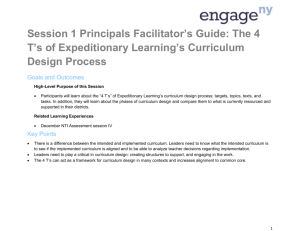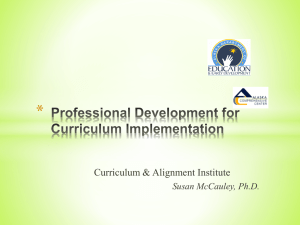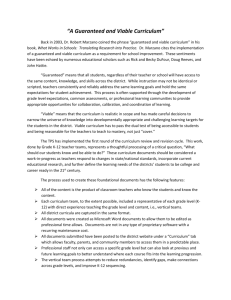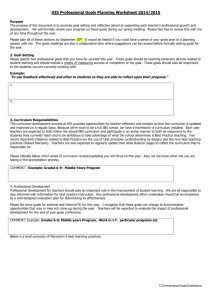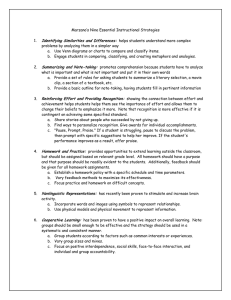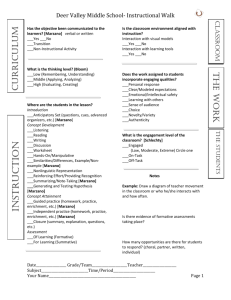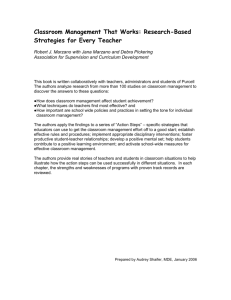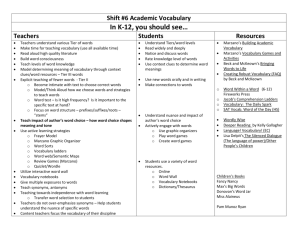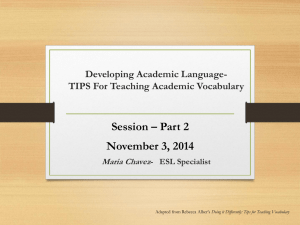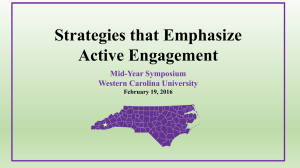Curriculum Design: The 4 T's & Common Core Alignment
advertisement
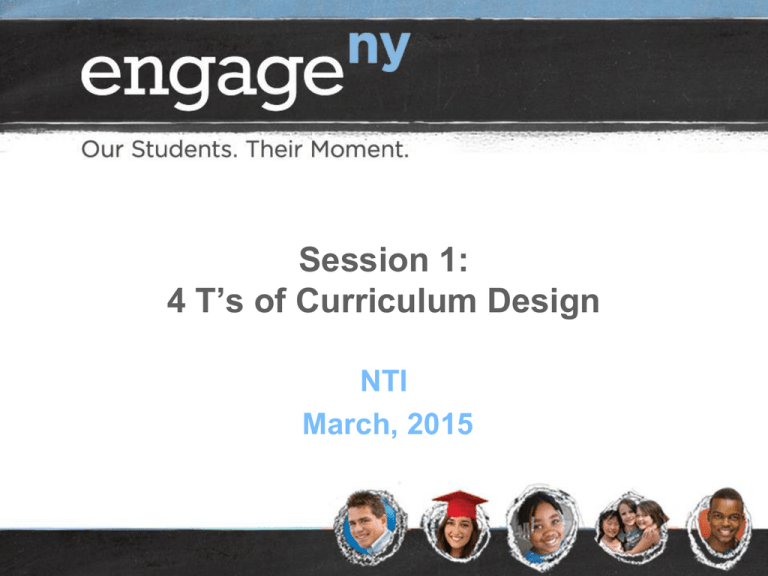
Session 1: 4 T’s of Curriculum Design NTI March, 2015 Our Beliefs about Adult Learning 2 Norms for Collaboration • Review Norms for Collaboration p.1-4 • Self-Assess • Set a Goal 3 Agenda Day 1 •4 T’s of Curriculum Design •Components of Common Core curriculum •Critiquing Text Selection Day 2 •Critiquing Assessments •Quality PD for Curriculum Design 4 Learning Targets 1. I can explain how the principal’s role in curriculum design impacts student achievement. 2. I can describe the “4Ts” of Common Corealigned curriculum design. 3. I can describe the phases of curriculum design and compare them to what we currently resource/support. 5 Curriculum • How do you define curriculum? • The term curriculum refers to the lessons and academic content taught in school or in a specific course or program. • An individual teacher’s curriculum would be the specific learning standards, lessons, assignments, and materials used to organize and teach a particular course. 6 Curriculum Overt, explicit or written curriculum is that which is written as part of formal instruction of the schooling experience. It may refer to a curriculum document, texts, and supportive materials that are overtly chosen to support the intentional instructional agenda of a school. 7 Curriculum Curriculum can be envisaged from different perspectives. What societies envisage as important teaching and learning constitutes the "intended" curriculum. Since it is usually presented in official documents, it may be also called the "written" and/or "official" curriculum. However, at classroom level this intended curriculum may be altered through a range of complex classroom interactions, and what is actually delivered can be considered the "implemented" curriculum. What learners really learn (i.e. what can be assessed and can be demonstrated as learning outcomes/learner competencies) constitutes the "achieved" or "learned" curriculum. In addition, curriculum theory points to a "hidden" curriculum (i.e. the unintended development of personal values and beliefs of learners, teachers and communities; unexpected impact of a curriculum; unforeseen aspects of a learning process). 8 Learning Target 1. I can explain how the principal’s role in curriculum design impacts student achievement. 9 “What Works” - Marzano The first school-level factor is a “guaranteed and viable curriculum.” I rank this as the first factor, having the most impact on student achievement. As indicated in Figure 2.3 (p. 19), a guaranteed and viable curriculum is primarily a combination of my factors “opportunity to learn” and “time” (Marzano, 2000a). Both have strong correlations with academic achievement, yet they are so interdependent that they constitute one factor. 10 “Focus” - Schmoker What We Teach. This simply means a decent, coherent curriculum, with topics and standards collectively selected by a team of teachers from the school or district—that is actually taught. The number of "power standards" (Ainsworth, 2003a) must not be excessive; it should account for about half of what is contained in our standards documents (Marzano, 2003). This allows us to teach the essential standards in sufficient intellectual depth, with adequate time for deep reading, writing, and talking. Why is this so important? Because such "guaranteed and viable curriculum" (Marzano, 2003, p. 22) is perhaps the most significant school factor that affects learning. But such a curriculum is found in very few schools (Berliner, 1984; Marzano, 2003; Schmidt, 2008). 11 Learning Target 2. I can describe the 4 T’s of Common Corealigned curriculum design. 12 Transformational Literacy • How do the 4 T’s support students in meeting the Common Core reading and writing standards? (See pgs. 86-93). What new information did you gain regarding common core aligned literacy curriculum? What information is relevant to your school/district and why? 13 The 4 T’s • While viewing, take notes on new information regarding the 4 T’s. (pg. 9) • Goal: be able to explain how they work together. 14 Role Play • You just recently delivered a PD about the 4 T’s to your entire staff. You gave an overview and then dug deeply into “Topic.” • A teacher who missed the PD session keeps hearing other staff discussing the “4 T’s” and she is irked that she doesn’t know what they are referring to. • She won’t leave your office until she knows what the 4 T’s are. 15 Curriculum Planning • Locate p. 10 (you may skim p.11-14 or read later) • Consider: which of these stages are occurring while your teachers plan curriculum? • Most importantly – how do you know? 16 Transformational Literacy • • • • Where are your teachers at? How do you know? What would be the right next step for them? What professional development do they need and how will you provide it? (pgs. 57-71) 17 Learning Targets 1. I can explain how the principal’s role in curriculum design impacts student achievement. 2. I can describe the “4Ts” of Common Corealigned curriculum design. 3. I can describe the phases of curriculum design and compare them to what we currently resource/support. 18
